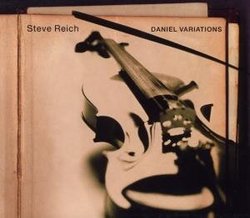| All Artists: Steve Reich, Grant Gershon, Alan Pierson, London Sinfonietta Title: Steve Reich: Daniel Variations Members Wishing: 5 Total Copies: 0 Label: Nonesuch Original Release Date: 1/1/2008 Re-Release Date: 4/8/2008 Genre: Classical Styles: Opera & Classical Vocal, Chamber Music, Forms & Genres, Concertos, Historical Periods, Classical (c.1770-1830) Number of Discs: 1 SwapaCD Credits: 1 UPC: 075597994940 |
Search - Steve Reich, Grant Gershon, Alan Pierson :: Steve Reich: Daniel Variations
CD Details |
CD ReviewsMore from Steve Reich Jeff Abell | Chicago, IL USA | 05/21/2008 (4 out of 5 stars) "To say that a "Minimalist" composer repeats himself is a bit of a tautology. Of the three composers most often associated with Minimalism (Riley, Reich, and Glass), each has had a unique compositional arch in their work. Riley, invigorated by his relationship with the Kronos Quartet and his own continued work as a performer, has poured his creativity into a wide-range of projects and pieces, flexing his stylistic muscles with each new project. Glass (in my opinion) has been stuck in a rut for two decades now, and I keep waiting for that brilliant, unexpected flash of genius to happen. (Hey, it happened to Matisse, why not Philip Glass?) Reich's process has been - like his music - more measured. The early loop-based works evolved gradually into complex ensemble pieces (reaching an apex in Music for 18 Musicians). The re-involvement of text that happened first in Different Trains prompted an unexpected direction and led to some remarkable works, and a darkening tonal palette more consistent with European music than American minimalism. Reich has continued to evolve new works out of an interface of his ensemble practices and his text-based pieces, most interestingly when collaborating with his wife Beryl Korot on video/theater projects. This new CD is not filled with surprises: it contains a moving choral work written as a memorial to Daniel Pearl, and an engaging instrumental ensemble piece. If listeners are expecting a stylistic revelation (that flash of genius referred to earlier), they'll be disappointed. If, on the other hand, you enjoy Reich's work, and want to listen to more consistently engaging and well-crafted music from one of the great composers of our age, then I don't think this disc will disappoint." Steve Reich's Late Style Alex Grimley | bennington | 07/28/2008 (4 out of 5 stars) "Since his Triple Quartet of 1999, Steve Reich has been engaged in a project of loosening up the compositional processes and contrapuntal grids that framed his earlier work. As early as Octet (1979) and Sextet (1984), Reich was situating structural and harmonic changes within unbroken melodic and rhythmic material. The Counterpoint pieces (1982, 1985, 1987) make this concern with continuously resounding texture and dense harmonic space more explicit. Daniel Variations (2006) delivers probably the most searing melodic material of Reich's career. While the strings are given the task of doubling the voices in the first and third movements of the piece, Reich makes them the dynamic--sometimes mournful sometimes nostalgic--emotive center of the second and fourth movements. In recent years, Reich has forgone the sprite, canonic interlocking rhythmic patterns of the 70s and 80s in favor of denser rhythmic accompaniment, extended chords struck out in what Alex Ross has called "telegraphic patterns." Throughout the piece, at two or four pianists or vibraphonists (among ten percussion players total) hammer out these structural patterns. Defying the regularity of the constant pulse that underpinned Reich's classic Music for 18 Musicians (1976), these 'telegraphic' patterns convey a sense of perpetual, unyielding forward energy. While the harmonies assigned to these rhythmic patterns creates a range of emotional import, their kinetic energy is felt throughout the entirety of the piece. The remaining percussionists play (usually brightly colored) accentuations often synchronized with certain syllables sung by the vocalists. These brilliant, thickly resonant chords both provide the bass information of the chords while drawing out consonances in the middle and high ranges and especially the voices. This most recent recording of Reich's music serves to show just how much his music has evolved since the diatonic harmony and steady pulse he used during the 1970s. Reich has synthesized that harmonic language with the more chromatic language he developed throughout the 1980s. The result, as we hear in Daniel Variations, is a highly nuanced range of expressive potential. Furthermore, the formal and structural means by which Reich allows this expressive quality to flourish demonstrate clearly the fruits of an intelligent, self-critically modernist composer who continues to reinvigorate and renew his musical vocabulary." Words Are Very Important in Reich's Music Ivan Weiser | Santa Fe, NM USA | 06/21/2008 (5 out of 5 stars) "As in all of Reich's later music, the words he has chosen to set are of the greatest importance to him, and add a profound depth to the message of his music. In "Daniel" (as well as his other late works) Reich is writing as a religious Jew, with all that that implies (and in Judaism, as also in Christianity, the spoken Word is of great theological significance - as is also the significance of a person's name. Names, in the Old Testament, have both power and meaning).
In the Daniel Variations, a work commissioned by Daniel Pearl's parents, all this comes very much into play. The four short texts all empower the music with tremendous meaning, and the the text of the concluding one - "I sure hope that Gabriel [the archangel - Amazon is mistaken in putting the word "Daniel" in its place here] likes my music when the day is done" makes for a stunning and moving conclusion. (Significantly, Reich himself added "when the day is done" to Daniel Pearl's joking words to a friend of his.) The underlying religious message of Reich's later music does not seem to resonate well with some of his fans. " |

